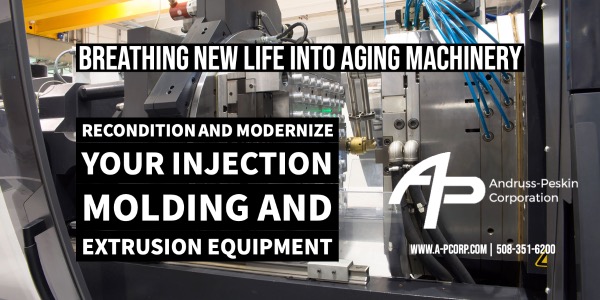Reconditioning of plastic injection mold and extrusion machines is a process that involves restoring or upgrading the machine to improve its performance, efficiency, and lifespan. This process can include replacing worn-out or outdated components, updating control systems, and enhancing the overall functionality of the machine. Key elements to consider for reconditioning are control systems, HMI (Human-Machine Interface), pressure sensors, temperature sensors, and feed screws. Here's a list of items to consider when reconditioning these machines:
- Inspection and assessment: Begin by thoroughly examining the machine to identify worn-out or damaged components, as well as outdated control systems and sensors. This assessment will help you determine the necessary upgrades and replacements needed.
- Disassembly: Carefully disassemble the machine, taking note of the locations and orientations of each component for reassembly later. Clean each part to remove accumulated debris and contaminants.
- Control system replacement: Remove and replace the existing control system with a modern, programmable system that offers improved performance and efficiency. This new system should be compatible with existing hardware and allow for seamless integration with the machine.
- HMI upgrade: Replace the old HMI with a modern, user-friendly interface that simplifies machine operation, monitoring, and control. This new HMI should be compatible with the updated control system and provide enhanced visualization and data-logging capabilities.
- Pressure sensor replacement: Replace outdated or damaged pressure sensors with new, high-precision sensors calibrated appropriately and integrated with the control system, ensuring accurate pressure measurement and monitoring throughout the injection and extrusion process.
- Temperature sensor replacement: Install new temperature sensors that provide accurate and reliable measurements. These sensors should be compatible with the control system and HMI, allowing for real-time monitoring and control of temperature during the injection and extrusion process.
- Feed screw replacement: Inspect the feed screws for wear, damage, or reduced efficiency. Replace them with new, high-performance screws designed for optimal material mixing and flow. Ensure proper alignment and installation to minimize wear and improve overall machine performance.
- Lubrication and maintenance: Lubricate all moving parts and replace worn-out seals or gaskets. Perform routine maintenance tasks such as filter changes and cleaning to ensure the machine operates smoothly.
- Reassembly: Reassemble the machine, ensuring all components are correctly installed and aligned. Double-check connections and wiring to ensure proper communication between sensors, control systems, and the HMI.
- Testing and calibration: Power the machine on and conduct a series of tests to verify proper function and performance. Calibrate the control system, sensors, and HMI to ensure accurate readings and control.
With these core steps, you can successfully recondition a plastic injection mold or extrusion machine, ensuring it operates efficiently and reliably for years.

